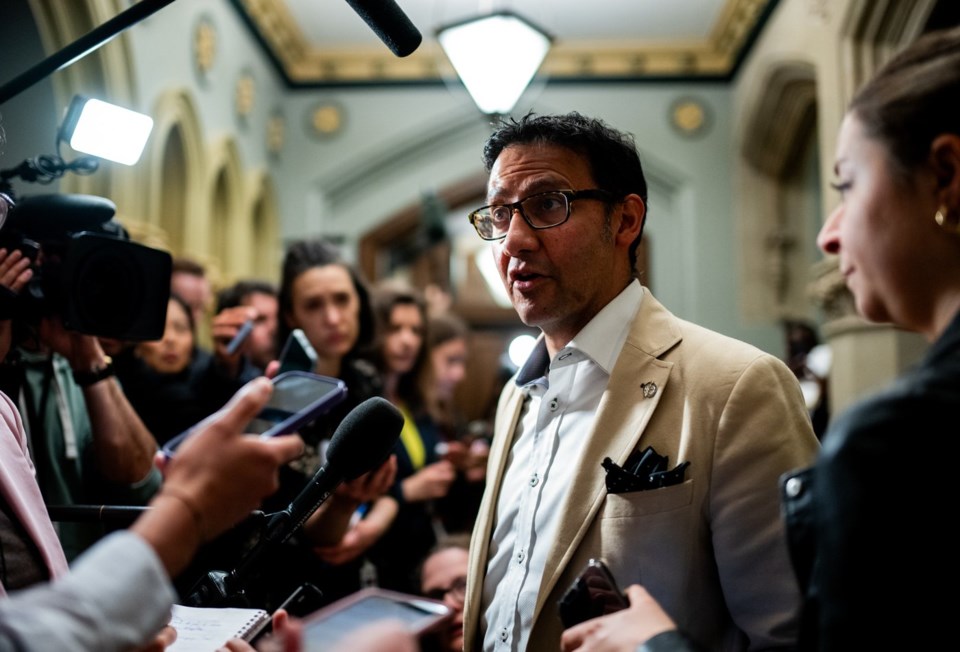OTTAWA — Three weeks after the federal Liberals promised to do a "formal, independent review" of the appointment of Canada's new human-rights commissioner, the government hasn't provided any details about what that review will entail.
Birju Dattani, former executive director of the Yukon Human Rights Commission, was named as the new head of the Canadian Human Rights Commission on June 14.
On Aug. 8, he is set to start a five-year term in the new job, as the first person of colour and the first Muslim man to hold the role.
But his appointment fell under scrutiny after media reported that he made anti-Israel comments as a graduate student under different names that were not flagged during the vetting process.
The Privy Council Office, the administrative arm of government that serves the Prime Minister's Office and cabinet, oversees the screening process of federal appointees.
It says an "administrative oversight" occurred that meant the vetting process didn't include all of Dattani's aliases. They have since been shared with the RCMP and CSIS, which "are now completing necessary reviews," said spokesman Daniel Savoie.
A new directive has also been issued within the Privy Council Office to ensure this problem doesn't happen again.
But prominent Jewish organizations have demanded the government reconsider the appointment, and both the Conservatives and Bloc Québécois say Dattani should withdraw or be replaced. The Tories have also said they will rescind the appointment if they form the next government.
Dattani has previously called the allegations against him unfounded and said he stands by his record working in human rights.
He has not responded to a request for comment, but his lawyer said in a statement last week that he would challenge any attempt to have him removed.
In late June, the office of Justice Minister Arif Virani said it would be doing an investigation. Since then, it has provided no indication that any kind of review has begun.
"I have not heard anything about the investigation, and I have not even seen the terms of reference," Richard Marceau, vice-president for the Centre of Israel and Jewish Affairs, said in an interview.
"It's a bit fuzzy about what's happening."
Jaime Kirzner- Roberts, director of policy and advocacy at the Friends of Simon Wiesenthal Center, said her organization is disappointed it hasn't heard from Virani.
"How is it possible that the minister, after his appointment, was unaware of some basic facts that were dug up by a simple Google search?" said Kirzner- Roberts.
"These are just among the questions that we would like answered by an investigation."
Richard Robertson, B'nai Brith Canada's director for research and advocacy, said he met with Virani's office and was told the investigation would be completed before Dattani's scheduled start.
Virani's office confirmed Thursday that the review is "expected to conclude" by Aug. 8, but would only add that "additional information will be forthcoming shortly."
With less than a month until that time, a government source said Ottawa is looking at ways to delay Dattani's arrival. The source spoke under condition of anonymity because they were not authorized to speak publicly.
Virani's office previously committed that it would make the results of any review public.
At issue are some now-deleted posts Dattani made under the name Mujahid Dattani while he was a graduate student in London almost a decade ago.
Dattani has said that in 2014, he shared an article titled "Palestinians are Warsaw Ghetto Prisoners of Today" on social media. He recently told CBC News and The Globe and Mail that he did not agree with its argument.
He has rejected accusations that he posted articles comparing Israel to Nazi Germany, as an article published in 2015 suggested.
An appearance that Dattani made around the same time on a panel alongside a member of Hizb ut-Tahrir, an Islamic fundamentalist group, was also flagged as a concern.
The National Council of Canadian Muslims has defended Dattani, saying it expects "any independent and fair process to fully exonerate" him.
It accused those calling for his ouster as "smearing" him for writing about political science topics such as terrorism.
NDP MP Randall Garrison said his party has yet to receive a clear timeline for when CSIS and the RCMP will complete its review.
"New Democrats strongly urge that this review be done as quickly, as thoroughly and as transparently as possible," he said in a statement.
Marceau said the incident raises questions about how the human-rights commission can be trusted to deal with antisemitism at a time when online hate is increasing and police are reporting a spike in related crimes.
"Can we really trust ... the setup by the government to tackle antisemitism online? That's a fair question."
Earlier this year, the government proposed legislation that would allow the Canadian Human Rights Commission to hear complaints of online hate speech.
The Online Harms Act, which also proposes stiffer penalties for hate crimes and seeks to hold social-media giants to account for harmful content, is still in the early stages of House of Commons debate.
This report by The Canadian Press was first published July 12, 2024.
Stephanie Taylor, The Canadian Press



